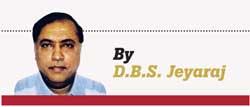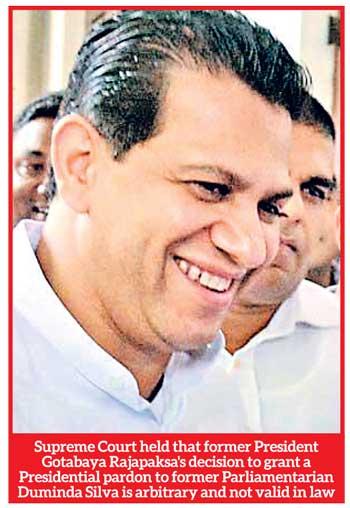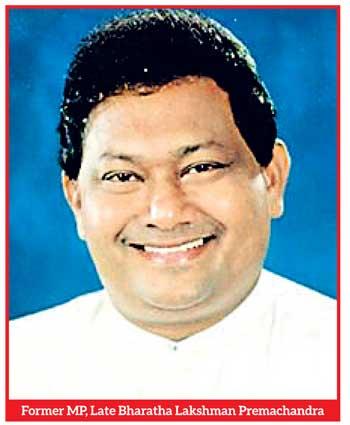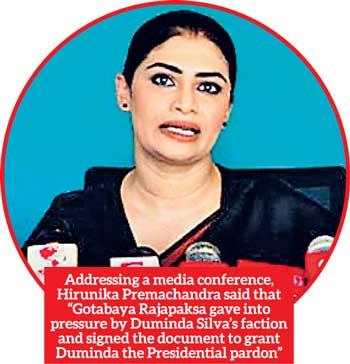Reply To:
Name - Reply Comment
 Nandasena Gotabaya Rajapaksa was portrayed as a monument of efficiency who could uplift Sri Lanka by his ‘Viyathmaga’ cronies and his family party the Sri Lanka Podujana Peramuna (SLPP) at the Presidential elections of 2019. More than 6.9 million people voted him to stupendous success,
Nandasena Gotabaya Rajapaksa was portrayed as a monument of efficiency who could uplift Sri Lanka by his ‘Viyathmaga’ cronies and his family party the Sri Lanka Podujana Peramuna (SLPP) at the Presidential elections of 2019. More than 6.9 million people voted him to stupendous success,
Barely three years later Gotabaya fled Sri Lanka and resigned as President due to a mass uprising against him that was described as the “Aragalaya”. A large number of the voters who elected him to office realised belatedly that their ‘hero’ was an incompetent, inefficient person who was unfit to be the President of Sri Lanka.
This notion of an inefficient ‘Veda beri Gota’ () was further reinforced this week by the Supreme Court of Sri Lanka. A three-judge bench comprising Justices Preethi Padman Surasena, Gamini Amarasekara and Arjuna Obeysekera ordered to set aside the Presidential pardon granted by the former the President to ex-MP, Duminda Silva for not following the Constitutional provisions correctly. Of course some may say this was not merely proof of his inadequacy or inefficiency but also an indication of Gota’s authoritarian arrogance.
Hirunika Mocks
 Former Parliamentarian Hirunika Premachandra mocked the ex-President after the landmark Supreme Court ruling. As is well known, Hirunika is the daughter of former MP Bharatha Lakshman Premachandra for whose murder Duminda Silva was convicted. Hirunnika’s FR petition was one of the three taken up by the Supreme Court.
Former Parliamentarian Hirunika Premachandra mocked the ex-President after the landmark Supreme Court ruling. As is well known, Hirunika is the daughter of former MP Bharatha Lakshman Premachandra for whose murder Duminda Silva was convicted. Hirunnika’s FR petition was one of the three taken up by the Supreme Court.
Addressing a media conference, Hirunika Premachandra said that “Gotabaya Rajapaksa was so ignorant that he could not even adopt the due procedure in granting a Presidential Pardon.” She further alleged that “Gotabaya Rajapaksa gave into pressure by Duminda Silva’s faction and signed the document to grant Duminda the Presidential pardon, and ultimately ended up being humiliated”
Arumadura Lawrence Romelo Duminda Silva known as Duminda Silva was the fortunate recipient of a munificent Presidential Pardon on 24 June 2021. The convict on death row was released as a result of the pardon. Duminda Silva, a former Parliamentarian and ex-Provincial Councillor, was involved in a shooting incident in October 2011 during Local Authority Elections, where former MP Bharatha Lakshman Premachandra and three of his bodyguards were killed.
The High Court of Sri Lanka convicted Duminda Silva and four of his associates for murder and imposed the death sentence on them in September 2016. Subsequently, the sentence was appealed, but a five-Judge bench of the Supreme Court upheld the murder conviction of Silva in October 2018. Despite the High Court conviction of 2016 being upheld by the Supreme Court in 2018, Duminda Silva was a free man in 2021 on Poson Poya Day. The then President Nandasena Gotabaya Rajapaksa invoking article 34(1) of the Constitution, granted a Presidential pardon to 93 convicted prisoners including Duminda Silva on Poson Poya Day of 24 June 2021.
FR Petitions
Consequently, Bharatha’s daughter and Ex- MP, Hirunika Premachandra, her mother, Sumana Premachandra and former Commissioner of the Human Rights Commission of Sri Lanka (HRCSL), Ghazali Hussain filed three Fundamental Rights petitions challenging the legality of the Presidential pardon granted to Duminda Silva.
After hearing the three Fundamental Rights petitions filed challenging the legality of the Presidential pardon granted by Gotabaya Rajapaksa, the Supreme Court ruled on 17 January 2024 that the former President’s decision to grant a Presidential pardon to Duminda Silva was not valid in law, and quashed it. It was a unanimous decision of the three-judge bench.
Justice Preethi Padman Surasena delivered the judgement with Judges AGR Amarasekara and Arjuna Obeyesekere concurring. The court declared that the pardon granted to Duminda Silva by the former President was null and void and had no effect in law.
 “As set out in Article 33(h) of the Constitution, it has only empowered the President to do acts and things which would not be inconsistent with the provisions of the Constitution or written law. Thus, in this instance I hold that the former President has clearly violated the provisions in Section 3 (q) of the Assistance to and Protection of Victims of Crime and Witnesses Act No. 04 of 2015. I have to accept the Petitioners’ argument that the instant grant of pardon to the recipient of the pardon by the former President of the country, has totally eroded the confidence the public has reposed in the criminal justice system of the country,” stated Justice Surasena.
“As set out in Article 33(h) of the Constitution, it has only empowered the President to do acts and things which would not be inconsistent with the provisions of the Constitution or written law. Thus, in this instance I hold that the former President has clearly violated the provisions in Section 3 (q) of the Assistance to and Protection of Victims of Crime and Witnesses Act No. 04 of 2015. I have to accept the Petitioners’ argument that the instant grant of pardon to the recipient of the pardon by the former President of the country, has totally eroded the confidence the public has reposed in the criminal justice system of the country,” stated Justice Surasena.
SC Ruling Conclusion
The conclusion of the judgement was as follows -
“I have no legal basis or even a factual basis to uphold the decision made by the former President to grant a pardon to the recipient in the instant case. I hold that the said decision is arbitrary, irrational and has been made for the reasons best known to the former President who appears to have not even made any written decision and has not given any reason thereto. Further, no reason can be discerned from any document submitted by Hon. Attorney General as forming part of the record pertaining to the impugned grant of pardon. The Petitioners are therefore entitled to succeed with their petitions.
I proceed to grant the following relief to the Petitioners in SC FRA No. 221/ 2021, SC FRA No. 225/ 2021 and SC FRA No. 228/ 2021:
a) declaration that the Fundamental Rights guaranteed to the Petitioners by Article 12(1) of the Constitution have been infringed by the act of granting the afore-stated pardon to Arumadura Lawrence Romello Duminda Silva who stands as the 2nd Respondent in SC FRA No. 221/2021 and SC FRA No. 225/2021 and the 4th Respondent in SC FRA No. 228/2021 by the President of the country (former President) acting in his official capacity;
b) declaration that the decision to grant the pardon to Arumadura Lawrence Komello Duminda Silva who stands as the 2nd Respondent in SC FRA No. 221/2021 and SC FRA No. 225/2021 and the 4th Respondent in SC FRA No. 228/2021 by the President of the country (former President) is null and void and of no force or avail or any effect in law;
c) declaration that the pardon granted to Arumadura Lawrence Romello Duminda Silva who stands as the 2nd Respondent in SC FRA No. 221/2021 and SC FRA No. 225/2021 and the 4th Respondent in SC FRA No. 228/2021 by the President of the country (former President) is null and void and of no force or avail or any effect in law:
I proceed to quash the decision to grant the pardon to Arumadura Lawrence Romello Duminda Silva who stands as the 2nd Respondent in SC FRA No. 221/2021 and SC FRA No. 225/2021 and the 4th Respondent in SC FRA No. 228/2021 by the President of the country (former President).
I direct the Commissioner General of Prisons to take necessary steps in terms of law with regard to the implementation of the sentences imposed on Arumadura Lawrence Romello Duminda Silva (the 2nd Respondent in SC FRA No. 221/2021 and SC FRA No. 225/2021 and the 4th Respondent in SC FRA No. 228/2021) as per the judgments of Court (the judgment of
High Court of Colombo Case No. 7781/2015 read with the judgment of Supreme Court in case No. SC/TAB/2A-D/2017).
Legal Eagles
 M.A. Sumanthiran PC with Suren Fernando appeared for former Parliamentarian Hirunika Premachandra. Eraj de Silva PC with Daminda Wijeratne, Janagan Sundramoorthy, Shehan Chamika Silva instructed by Dimuthu Kuruppuarachchi appeared for Sumana Premachandra. Jeffry Alagaratnam PC appeared for Attorney-at-Law Ghazali Hussain.
M.A. Sumanthiran PC with Suren Fernando appeared for former Parliamentarian Hirunika Premachandra. Eraj de Silva PC with Daminda Wijeratne, Janagan Sundramoorthy, Shehan Chamika Silva instructed by Dimuthu Kuruppuarachchi appeared for Sumana Premachandra. Jeffry Alagaratnam PC appeared for Attorney-at-Law Ghazali Hussain.
Gamini Marapana PC, Navin Marapana PC, Manohara de Silva PC and Anuja Premaratna PC appeared for Duminda Silva. Dr. K. Kanag-Isvaran PC appeared for the Bar Association of Sri Lanka. Additional Solicitor General Nerin Pulle appeared for the Attorney General.
Sumanthiran PC
Hirunika Premachandra’s lawyer, MA Sumanthiran was contacted by this column for his views about the case. The Jaffna district Parliamentarian cum President’s Counsel observed thus - “This is a historic verdict. Hitherto it was assumed that an Executive pardon was not justiciable. This ground breaking judgment shows that no decision of the Executive is beyond review (except perhaps, the Declaration of War and Peace, since that is specifically excluded in the Constitution). This power of the President is clearly distinguishable from the Royal Prerogative, and can be reviewed by court; a welcome precedent that enhances the Rule of Law, and militates against arbitrariness.”
Let me conclude with a brief chronological outline of legal proceedings concerning the prosecution, conviction and ‘absolution’ of Duminda Silva.
Killed in Shoot-out
Bharatha Lakshman Premachandra known as “Lucky Aiya” and three of his bodyguards were killed on 8 October 2011 in a shoot-out near the Walpola junction close to Mulleriyawa town, about six miles away from Colombo city. Another bodyguard was seriously injured.
Instead of the perpetrators being arrested, the country was regaled with what appeared to be a massive cover-up exercise. There was an undue delay in effective legal proceedings being instituted. There was a long period of perceived procrastination attributed euphemistically to the law’s delays. The matter dragged on for years and it was widely believed that the aphorism “Justice Delayed is Justice Denied” was being proven true in this instance also.
The advent of a new dispensation under President Maithripala Sirisena and Prime Minister Ranil Wickremesinghe in 2015 saw a fresh breeze blowing in musty judicial corridors. The Attorney-General filed an indictment in courts on March 2015 for the killings of Bharatha Lakshman Premachandra, Dharshana Jayathilake, Mohamed Azmi and Manivel Kumaraswamy and also for inflicting gunshot injuries on Rajapurage Gamini.
Trial-at-Bar
The indictment consisted of 17 charges against 13 suspects including Duminda Silva. The then Chief Justice, Kanagasabapathy Sripavan, appointed in May 2015 a three-member bench for Trial-at-Bar proceedings. The bench comprised three High Court Judges, namely Shiran Guneratne, Pathmini Ranawaka and M.C.B.S. Moraes. The Chairman was Shiran Guneratne.
Trial-at-Bar proceedings began on 22 May 2015. The case was heard on a regular basis from 12 September 2015. The names of the 13 accused were Chandana Jagath Kumara, Lanka Rasanjana, Malaka Sameera, Widanagamage Amila, Suranga Premalal, Saman Kumara, Saman Abeywickrema, Rohana Marasinghe, Duminda Silva, Anura Thushara de Mel, Chaminda Ravi Jayanath alias Dematagoda Chaminda, Dissanayake Mudiyanselage Sarath Bandara and Janaka Bandara Galagoda. The last named was tried in absentia as he was absconding. The accused were charged under Sections 296, 140, 146, 147, 486 and 300 of the Penal Code and some clauses of the Firearms Act.
Among the 17 charges were committing and conspiring to commit murder of four individuals, attempted murder, possessing illegal firearms, inflicting gunshot injuries, unlawful assembly and criminal intimidation on or around 8 October 2011. A team of lawyers from the Attorney General’s Department led by Deputy Solicitor General Thusith Mudalige represented the prosecution; 42 witnesses testified in Courts and 126 documents including Government Analysts reports and JMO reports were produced.
Two to One Verdict
Trial-at-Bar proceedings concluded on 14 July 2016. The verdict in the high profile trial was delivered on 8 September 2016. It was a divided verdict with two of three Judges finding five of the accused guilty and acquitting eight others. One judge however found all 13 accused not guilty.
High Court Judge Pathmini N. Ranawaka pronounced the two to one majority verdict in the packed Courthouse with Judge Moraes concurring. Judge Pathmini Ranawaka delivering the majority verdict stated that the prosecution had proved during the trial that the provocative conduct of 11th accused Duminda Silva led to the whole incident.
Courts then acquitted and discharged eight of the accused. They were – Chandana Jagath Kumara, Lanka Rasanjana, Malaka Sameera, Widanagamage Amila, Suranga Premalal, Saman Kumara, Saman Abeywickrema and Rohana Marasinghe.
Death Sentence
The death sentence was pronounced for five persons. They were – Duminda Silva, Anura Thushara De Mel, Chaminda Ravi Jayanath alias Dematagoda Chaminda, Dissanayake Mudiyanselage Sarath Bandara and Janaka Bandara Galagoda.
he 10th accused, Janaka Bandara Galagoda was tried in absentia and convicted. In addition to the verdict of execution, the five convicted persons were also fined Rs. 40,000 each.
Appeal to Supreme Court
The Trial-at-Bar High Court ruling was appealed at the Supreme Court. A five-Judge bench of the Supreme Court presided over by the then Chief Justice Priyasath Dep upheld the conviction unanimously.
Chief Justice Dep issued a 51-page ruling on 11 October 2018. The outgoing Chief Justice Priyasath Dep in his order noted a string of crimes, including election law violations, committed by Silva and his cohorts culminating in the killing of Bharatha Lakshman Premachandra and three others. The five-Judge bench arrived at a unanimous decision. The others on the bench were justices Nalin Perera, Buwaneka Aluwihare, Priyantha Jayawardena and Vijith K. Malalgoda. The Supreme Court upheld that Bharatha Lakshman and three others were shot dead at the behest of Duminda Silva.
“Arbitrary and Irrational”
Though convicted for murder, Duminda Silva was pardoned due to the clemency of President Rajapaksa. No explanation was given. In that context, it is indeed poetic justice that the Supreme Court ruling chides the acts of omission and commission by Gotabaya Rajapaksa as “arbitrary and irrational”.
D.B.S. Jeyaraj can be reached at [email protected]